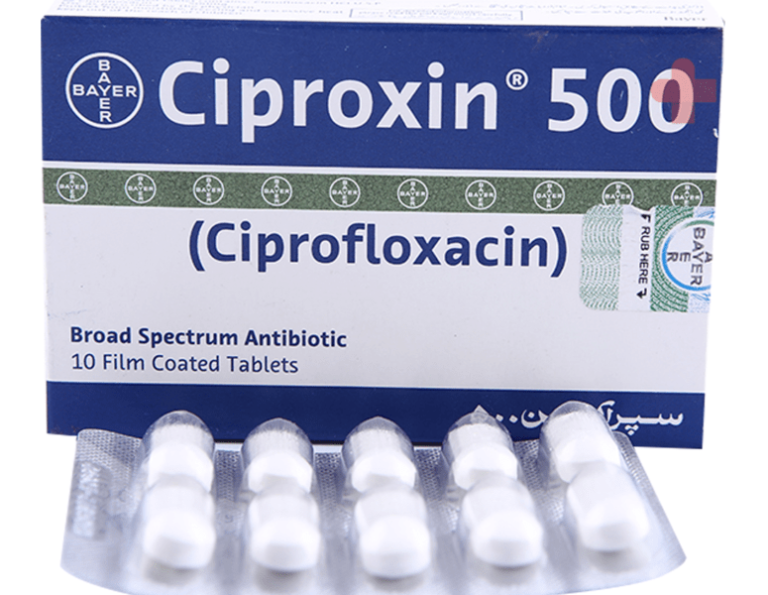
Ciprofloxacin (Cipro) is a fluoroquinolone used for the treatment of infections caused by susceptible gram-negative bacteria, including E. coli, P. mirabilis, K. pneumoniae, Enterobacter cloacae, P. vulgaris, P. rettgeri, M. morganii, P. aeruginosa,Citrobacter freundii, S. aureus, S. epidermidis, group D streptococci.
Indications
- For the treatment of infections caused by susceptible gram-negative bacteria, including E. coli, P. mirabilis, K. pneumoniae, Enterobacter cloacae, P. vulgaris, P. rettgeri, M. morganii, P. aeruginosa,Citrobacter freundii, S. aureus, S. epidermidis, group D streptococci
- Otic: Treatment of acute otitis externa
- Treatment of chronic bacterial prostatitis
- IV: Treatment of nosocomial pneumonia caused by Haemophilus influenzae, K. pneumoniae
- Oral: Typhoid fever
- Oral: STDs caused by N. gonorrheae
Contraindications and cautions
- Contraindicated with allergy to ciprofloxacin, norfloxacin or other fluoroquinolones, pregnancy, lactation.
- Use cautiously with renal dysfunction, seizures, tendinitis or tendon rupture associated with fluoroquinolone use
Dosages
ADULTS
- Uncomplicated UTIs: 100–250 mg PO q 12 hr for 3 days or 500 mg PO daily (ER tablets) for 3 days.
- Mild to moderate UTIs: 250 mg PO q 12 hr for 7–14 days or 200 mg IV q 12 hr for 7–14 days.
- Complicated UTIs: 500 mg bid PO q 12 hr for 7–14 days or 400 mg IV q 12 hr or 1,000 mg (ER tablets) PO daily for 7–14 days.
- Chronic bacterial prostatitis: 500 mg PO q 12 hr for 28 days or 400 mg IV q 12 hr for 28 days.
- Infectious diarrhea: 500 mg q 12 hr PO for 5–7 days.
- Anthrax postexposure: 500 mg PO q 12 hr for 60 days or 400 mg IV q 12 hr for 60 days.
- Respiratory infections 500–750 mg PO or 400 mg IV q 12 hr for 7–14 days.
- Acute sinusitis: 500 mg PO q 12 hr or 400 mg IV q 12 hr for 10 days.
- Acute uncomplicated pyelonephritis: 1,000 mg ER tablets PO daily for 7–14 days.
- Bone, joint, skin infections: 500–750 mg PO or 400 mg IV q 12 hr for 4–6 wk.
- Nosocomial pneumonia: 400 mg IV q 8 hr.
- Ophthalmic infections caused by susceptible organisms not responsive to other therapy: 1 or 2 drops per eye daily or bid or 1/2-inch ribbon of ointment into conjunctival sac tid on first 2 days, then apply 1/2-inch ribbon bid for next 5 days.
- Acute otitis externa: 4 drops in infected ear, tid–qid.
Adverse effects
- CNS: Headache, dizziness, insomnia, fatigue, somnolence, depression, blurred vision
- CV: Arrhythmias, hypotension, angina
- EENT: Dry eye, eye pain, keratopathy
- GI: Nausea, vomiting, dry mouth, diarrhea, abdominal pain
- Hematologic: Elevated BUN, AST, ALT, serum creatinine and alkaline phosphatase; decreased WBC, neutrophil count, Hct
- Other: Fever, rash
Nursing Assessment
- History: Allergy to ciprofloxacin, norfloxacin or other quinolones; renal dysfunction; seizures; lactation
- Physical: Skin color, lesions; orientation, reflexes, affect; mucous membranes, bowel sounds; renal and liver function tests
Nursing Interventions
- Arrange for culture and sensitivity tests before beginning therapy.
- Continue therapy for 2 days after signs and symptoms of infection are gone.
- Ensure that patient is well hydrated.
- Give antacids at least 2 hrs after dosing.
- Monitor clinical response; if no improvement is seen or a relapse occurs, repeat culture and sensitivity.
- Encourage patient to complete full course of therapy.
Patient Education
- Educate patient not to touch tip of eye ointment or solution for this may contaminate the product.
- Encourage patient to drink plenty of fluids while taking this drug.
- Educate patient on these side effects: Nausea, vomiting, abdominal pain (eat frequent small meals); diarrhoea or constipation; drowsiness, blurring of vision, dizziness (observe caution when driving or using dangerous equipment).
- Encourage patient to report rash, visual changes, severe GI problems, weakness, tremors.
[…] Clarithromycin (Biaxin) is a macrolide antibiotic. […]